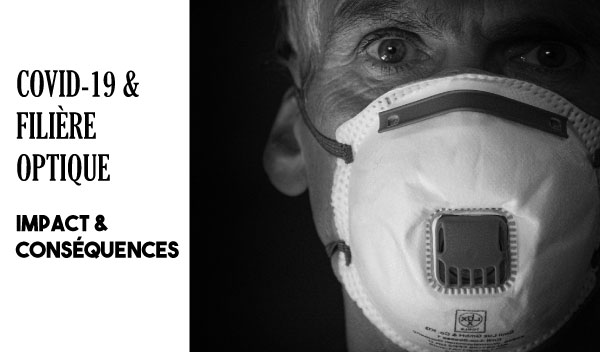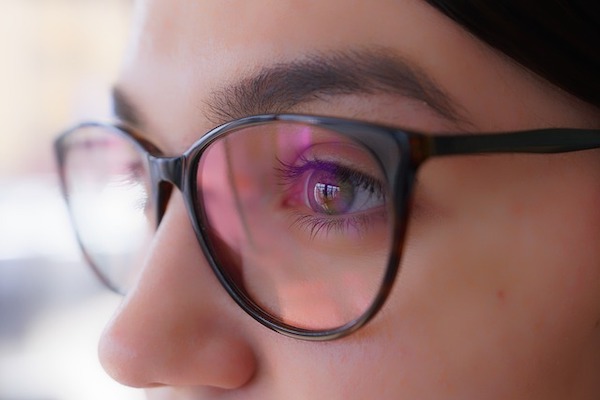FILE Covid-19 and the optical sector: Impact & consequences

Covid-19 is still here. However, in two years, many things have changed. Our approach to the disease and its developments in particular. Far from public debates, the optical sector has, like many others, been hit hard. The impact and consequences of Covid-19 on the optical sector have initiated a profound transformation. Autopsy of an ongoing phenomenon.
Confinements: from closed to essential
The health crisis that started in 2020 is of course the successive lockdowns in France (three in one year). With one notable difference. The first confinement, we remember, was the most marked. Very limited outings and short list of essential businesses. Among the latter, opticians. However, given the urgency of the situation and the shortage of protective equipment, many will be closed. They offer services via click and collect or drive. But also by appointment.
We understand then, there will be a before and after confinement. Above all, despite the right to remain open, opticians note that the public is not there. In the early days, we only go out for emergencies and basic necessities. The consequences of Covid-19 will have repercussions on the optical sector as on all other sectors.

For any business, this is a tough blow. Especially since two other confinements will follow. Less strict, but which will leave a lot of uncertainty and the conviction that a need to reorient is important.
Solutions to get back on your feet
For this, opticians and manufacturers alike will sometimes demonstrate originality, often agility. First of all, the mask is a real problem for glasses wearers. Anti-fog products have exploded. All-inclusive kits are even being awarded promotional campaigns never before seen for optical accessories. This is the case of the anti-fog kit from Zeiss Vision which will be used even in the Paris metro. But the reflection goes further than the possibility of making additional sales.
Indeed, this problem calls into question priorities while exacerbating the contradictions of the optical sector. While we see the most sophisticated equipment flourishing on the market, smart glasses and high tech optics at the forefront, the lenses have not yet integrated anti-fog treatment?
[ =] 
Of course it is. And even since 2011. But this is a very little used segment. Covid-19, again, changes the situation. Optical appointments are one of these consequences. The impact of digitalization, the use of teleworking, has made it possible to support these solutions so as not to have to wait idly.
Make an appointment online, for the merchant , allows you to have better visibility on your activity. Furthermore, the promotion of online optical tests, although not as relevant as those of a specialist, have the merit of maintaining contact with customers.
A recovery in the form of a rebound
The crisis has had other collateral effects on the sector. Business closures and multiple restrictions on travel or family reunions have presented users with choices. Since it was becoming complicated to travel, why not focus on other expense items?
Glasses are one of them. And then, faced with the uncertainty of how the situation will evolve, and the risk of other administrative closures or shortages of raw materials occurring, we ensure that the whole family is better equipped.

Spending much more time at home, in front of screens in particular, has played a major role in customers' approach to risks. Anti-blue light treatments have become even more important.
All of these factors have led to a considerable rebound in the optical industry . Logically, it was glasses that led to this rebound, while contact lenses and sunglasses remained behind. The fact of going out less, again, played a role.
The eco-responsible perspective has a role to play
We saw the materialization of a strong questioning of our lifestyles, especially in the early stages of the crisis. Public opinion, increasingly sensitive to environmental issues, could only note the beneficial effects of a virtual cessation of the production of industrial goods. But also the significant drop in use of transport networks.
Optical manufacturers who already had this fiber in them saw it as an opportunity to strengthen their values. Market ecology then took another turn. Although there are still many steps to take, eco-responsible optics is no longer a niche segment, but rather an imponderable part of the sector.
Facing the approach , there is the need to go against the usurpers. Highlighting your ability to use renewable materials is of no use if they have to be imported from the other side of the world. Using a local or responsible label is not necessarily a guarantee of quality, as the rules are sometimes incongruous.

Indeed, it is possible to obtain certain labels while having manufactured only one element of a frame according to its criteria. The health crisis will have contributed to creating a new horizon for actors who integrate responsible ecological and social values.
For the moment, if awareness is present, the approaches There is a lack of government support to push manufacturers and traders to fully integrate these elements into their commercial and production chains. The optical sector can be one of the drivers, as it has become aware of the problem.
The health crisis has, as a whole, redefined the basis of commerce. The consequences of Covid-19 on the optical sector have been numerous. If we are to expect to have to live with the virus, let us hope that this experience does not remain without follow-up in the face of the rules which can impact, upwards or downwards, a sector of activity. But nothing is less random.


